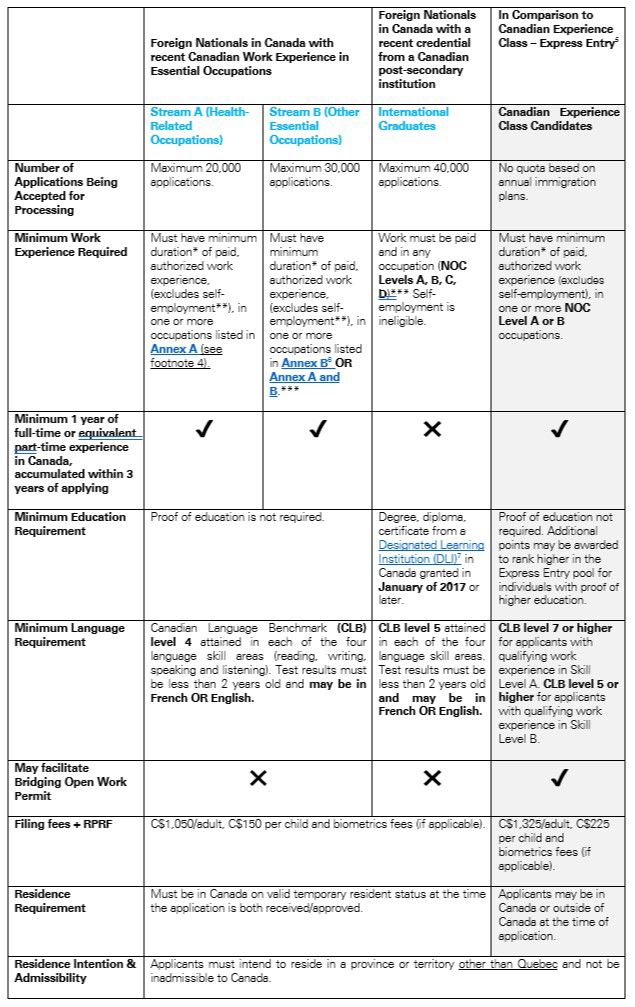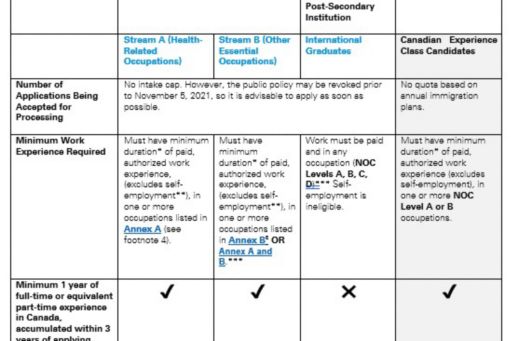Canada – New Permanent Residence Pathways for Essential Workers and International Graduates
CA – Permanent Residence Pathways
Canada announced April 14, 2021, a public policy that creates six new permanent residence pathways for 90,000 essential workers and international graduates who are contributing to Canada’s economy. Eligible applicants will be able to apply beginning May 6, 2021 through November 5, 2021, or until all spots are filled. This alert, which provides an overview of the pathways, is based on the recently published policies and a recent technical briefing for immigration practitioners hosted by Immigration, Refugee, and Citizenship Canada (IRCC).

On April 14, 2021, Canada announced a public policy that creates six new permanent residence pathways for at least 90,000 essential workers and international graduates who are contributing to Canada’s economy.¹ Eligible applicants will be able to apply beginning May 6, 2021 through November 5, 2021, or until all spots are filled.
This GMS Flash Alert, which provides an overview of the pathways, is based on the recently published policies and a recent technical briefing for immigration practitioners hosted by Immigration, Refugee, and Citizenship Canada (IRCC).
WHY THIS MATTERS
The new immigration pathways facilitate permanent residence status for temporary workers and international graduates who are in Canada both at the time of applying for and receiving permanent residence, and who possess the skills and experience needed to support Canada’s economic recovery during the COVID-19 pandemic.
Effective May 6, 2021, IRCC will begin accepting applications under six new streams. Given the increased number of applications being received this year, IRCC may face significant resourcing challenges when processing applications. Applicants should plan for potential processing delays and seek assistance to help ensure their applications are complete when filed to avoid delays or prevent applications from being returned.
Overview
The six programs provide permanent residence options for the following groups:
- Temporary workers in the health care sector;
- Temporary workers in other selected essential occupations; and
- International students who have graduated from a Canadian post-secondary institution.
The “Temporary public policy to facilitate the granting of permanent residence for foreign nationals in Canada, outside of Quebec, with recent Canadian work experience in essential occupations,”2 and the “Temporary public policy to facilitate the granting of permanent residence for foreign nationals in Canada, outside of Quebec, with a recent credential from a Canadian post-secondary institution”3 (together, “the Streamlined Programs”) apply to workers in 40 health-care occupations, as well as 95 other essential jobs across a range of fields, such as care-giving and food production and distribution, and some international graduates. A full list of eligible occupations can be found in Annex A.4
The Streamlined Programs also include three streams for French-speaking or bilingual candidates in order to promote Canada’s official languages and address the shortage of French-speaking individuals in Francophone communities outside of Quebec.
The Streamlined Programs support Canada’s ongoing goals to admit 401,000 new permanent residents in 2021 as part of its 2021-2023 Immigration Levels Plan. Facilitating permanent residence for individuals with work experience in critical occupations will ultimately support Canada’s long-term economic recovery.
Eligibility Requirements Under the New Public Policy
Effective May 6, 2021, IRCC will begin accepting applications under the six streams. The Streamlined Programs will remain open until the earlier of reaching the intake cap or until November 5, 2021. Currently, the application caps under the Streamlined Programs are as follows:
- 20,000 applications for temporary workers in the health care sector;
- 30,000 applications for temporary workers in other selected essential occupations; and
- 40,000 applications for international students who have graduated from a Canadian post-secondary institution.
The programs for French-speaking and bilingual candidates do not have an intake cap. To qualify under the Streamlined Programs, applicants must meet minimum work experience, language, and residence requirements, among others. To see a comparison of the six programs, please see the charts below in Schedule A (English and French speaking candidates) and Schedule B (French-speaking only candidates).
KPMG NOTE
- Language requirements are a critical part of the eligibility criteria and efforts should be made to submit language tests up-front. For interested parties, setting up a language test date at the earliest possible convenience may be an appropriate course of action.
- As most of the new programs are capped, temporary foreign workers who may benefit from the more relaxed application requirements of the new streams compared to the Express Entry requirements would probably be well-served by getting this information as soon as possible.
- It is expected that the student stream will be in very high demand. As spots are limited, it may become challenging to quickly set up a language test date in the short term, which interested parties may wish to prioritize in advance of the programs launching on May 6.
- Canadian employers seeking to transition their foreign workforce to permanent residence status should consider implementing appropriate communications, policies and processes.
Overview of Application Process and Additional Details
In the technical briefing mentioned above, IRCC advised that individuals seeking to apply to the Streamlined Programs should note the following.
- Application Mechanism: Applications must be submitted electronically via a new intake portal. Each applicant will be required to create an online account and submit their documents via the portal. Unlike other permanent residence programs using an online intake process, applicants will not receive an invitation to apply and will be processed on a first-come, first-serve basis.
- Applying to Multiple Streams: Individuals can apply to more than one stream; however, separate fees must be paid up-front for each application.
- Completeness of Application: IRCC recommends that applicants submit a complete application, with full documentation, at the time of applying, otherwise it may be refused.
IRCC advises that applications will not go through an initial completeness check and then be subject to procedural requests for anything that needs to be clarified. Applications will go directly to a review process and either refused or processed.
IRCC has emphasized that language requirements are a critical part of the eligibility criteria and efforts should be made to submit language tests up-front.
- Processing Times: IRCC has not yet provided this information for the Streamlined Programs.
- Accompanying Family: Applicants can include family members in the applications, regardless of whether their dependants are in Canada or abroad.
The aim of the Streamlined Programs is to encourage essential temporary workers and international graduates to remain in Canada permanently and help drive long-term economic growth across the country.
KPMG NOTE
Key Considerations for Employers and Potential Candidates
Planning ahead continues to be extremely important. Candidates who are outside of Canada may decide to explore temporary work permit options in order to move to Canada in the short-term and subsequently apply for permanent residence status.
Immigration processing trends remain uncertain due to COVID-19. Temporary foreign workers who are inside Canada should continue to maintain their temporary residence status while they wait for permanent residence.
The timing and parameters of these new programs are unpredictable and complex. Foreign nationals who have concerns about their permanent residence applications and next steps are encouraged to contact their employers, immigration adviser or KPMG Law LLP.
KPMG Law LLP will continue to provide updates as the Canadian government releases more details.
FOOTNOTES
1 See April 14 news release on IRCC website.
4 See Annex A – Eligible Health-Related Occupations (to the temporary public policy in footnote 2).
5 See Eligibility to apply for the Canadian Experience Class (Express Entry).
6 See ANNEX B – Other Eligible Essential Occupations (to the temporary public policy in footnote 2).
Schedule A:
Criteria for Pathways for English & French Speaking Candidates vs. Canadian Experience Class

* One year of full-time experience or equivalent of part-time in Canada, accumulated within the 3 years prior to applying.
** Except for medical doctors.
*** Applicants must be employed in any occupation at the time the application for PR is received and have valid work authorization.
Schedule B:
Criteria for Pathways for French-Speaking or Bilingual Candidates vs. Canadian Experience Class

* Please note the KPMG International member firm in the United States does not provide immigration or labour law services. However, KPMG Law LLP in Canada can assist clients with U.S. immigration matters.
The information contained in this newsletter was submitted by the KPMG International member firm in Canada.
VIEW ALL
SUBSCRIBE
To subscribe to GMS Flash Alert, fill out the subscription form.
© 2024 KPMG LLP, a Canada limited liability partnership and a member firm of the KPMG network of independent member firms affiliated with KPMG International, a Swiss entity. All rights reserved.
KPMG International Cooperative (“KPMG International”) is a Swiss entity. Member firms of the KPMG network of independent firms are affiliated with KPMG International. KPMG International provides no client services. No member firm has any authority to obligate or bind KPMG International or any other member firm vis-à-vis third parties, nor does KPMG International have any such authority to obligate or bind any member firm.
GMS Flash Alert is a Global Mobility Services publication of the KPMG LLP Washington National Tax practice. The KPMG name and logo are trademarks used under license by the independent member firms of the KPMG global organization. KPMG International Limited is a private English company limited by guarantee and does not provide services to clients. No member firm has any authority to obligate or bind KPMG International or any other member firm vis-à-vis third parties, nor does KPMG International have any such authority to obligate or bind any member firm. The information contained herein is of a general nature and is not intended to address the circumstances of any particular individual or entity. Although we endeavor to provide accurate and timely information, there can be no guarantee that such information is accurate as of the date it is received or that it will continue to be accurate in the future. No one should act on such information without appropriate professional advice after a thorough examination of the particular situation.
